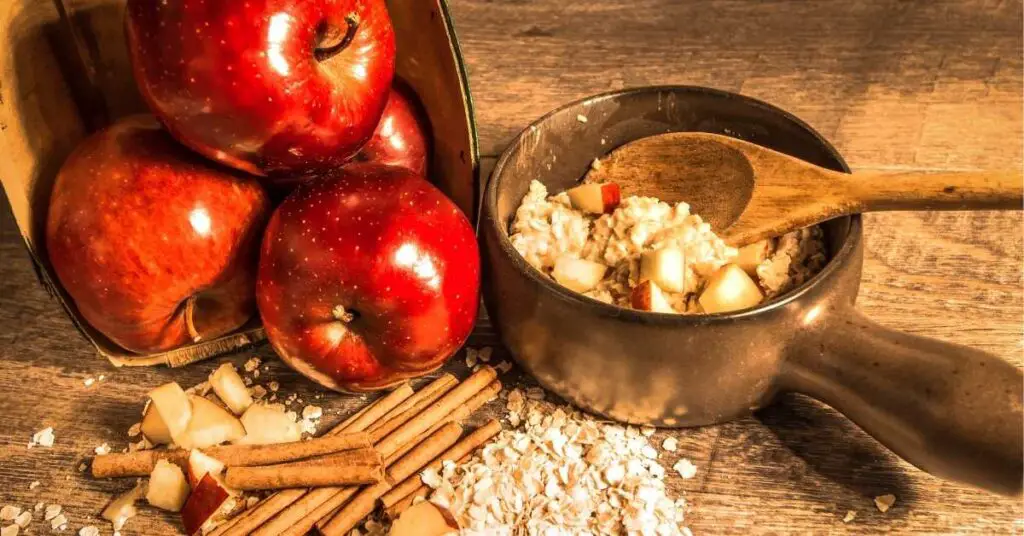Cinnamon and insulin sensitivity share a fascinating connection that has intrigued researchers and health enthusiasts.
Understanding how cinnamon may influence insulin sensitivity is crucial for individuals seeking natural ways to support their overall health, particularly those managing blood sugar.
This exploration explores the relationship between cinnamon consumption and its potential impact on insulin sensitivity—a critical factor in managing blood sugar levels.
Join us on a journey to unravel the science behind cinnamon and its potential role in promoting insulin sensitivity, offering practical insights that can be easily incorporated into daily habits for a healthier lifestyle.
What Is Cinnamon?

Cinnamon is a spice derived from the bark of trees in the Cinnamomum family.
It has a distinctive sweet and fragrant taste and has been used in cooking and traditional medicine for centuries.
Two types of cinnamon are commonly available – Ceylon cinnamon and Cassia cinnamon.
Ceylon cinnamon is considered valid and less common than Cassia cinnamon, which is more widely used.
While both types of cinnamon have similar health benefits, it is essential to note that Cassia cinnamon contains higher levels of coumarin, which can cause liver damage in large doses.
Cinnamon is a versatile spice that is not only a tasty addition to many dishes but has numerous health benefits, particularly for those with diabetes and insulin resistance.
What Is Insulin Sensitivity?

Insulin sensitivity refers to the body’s ability to use insulin to regulate blood sugar levels effectively.
Insulin is a hormone produced by the pancreas that helps transport glucose from the bloodstream into cells, used for energy.
In people with insulin sensitivity, their cells respond well to insulin, allowing glucose to enter the cells quickly.
However, in people with insulin resistance, the cells do not respond appropriately to insulin, causing glucose to accumulate in the bloodstream, leading to high blood sugar levels.
Insulin resistance is a common precursor to type 2 diabetes and other metabolic disorders.
It is essential to maintain good insulin sensitivity by following a healthy lifestyle, which includes exercise, diet, and stress management, as well as incorporating natural remedies like cinnamon, which has proven to improve insulin sensitivity in studies.
How Does Cinnamon Lower Blood Sugar And Fight Diabetes?

Cinnamon, considered a superfood, is rich in antioxidants, combating oxidative stress and benefiting conditions like type 2 diabetes.
Studies show it mimics insulin, enhancing insulin sensitivity and lowering blood sugar levels.
Cinnamon may decrease fasting blood sugar, improve insulin resistance, and reduce hemoglobin A1c.
It also mitigates post-meal blood sugar spikes by slowing stomach emptying and inhibiting digestive enzymes.
Beyond diabetes, cinnamon may lower risks of heart disease and Alzheimer’s.
Ceylon cinnamon, which has more antioxidants, is preferred over Cassia, which contains coumarin and may harm the liver.
Daily intake recommendations vary, but caution is advised, especially for those with diabetes, as cinnamon could interact with medications or lead to hypoglycemia.
Moreover, cinnamon also helps fight diabetes by reducing inflammation in the body, which is typically higher in people with diabetes.
High levels of inflammation can cause insulin resistance and damage to blood vessels, leading to various complications associated with diabetes.
Finally, cinnamon contains antioxidants that help protect cells from oxidative stress, which is also higher in people with diabetes.
All these properties make cinnamon a promising natural remedy for people with diabetes and those at risk of developing the condition.
Potential Role Of Cinnamon In The Prevention Of Insulin Resistance, Metabolic Syndrome, And Type 2 Diabetes

Cinnamon has gained attention for its potential role in preventing insulin resistance, metabolic syndrome, and type 2 diabetes.
It contains specific compounds, such as water-soluble polyphenols, with insulin-potentiating and antioxidant properties.
Also considered to treat oral diseases.
It appears to positively influence glucose metabolism, insulin sensitivity, and lipid profiles.
Additionally, cinnamon shows potential in addressing factors associated with Alzheimer’s disease and stroke.
However, not all studies agree on the positive effects of cinnamon, and the type and amount of cinnamon, as well as the subjects’ conditions and medications, can impact results.
Despite this, no adverse effects have been reported in studies.
Cinnamon shows promise in improving health markers related to various conditions; more research is needed to fully understand its effectiveness and the factors influencing its impact.
In moderation, you add cinnamon to your diet, which may be a flavorful and potentially beneficial choice.
Ceylon Cinnamon And Insulin Resistance

Cinnamon has gained significant attention in recent years for its potential to combat insulin resistance, a condition that can lead to obesity, metabolic syndrome, and type 2 diabetes.
Research has shown that Ceylon cinnamon, in particular, can improve insulin sensitivity and glucose metabolism in individuals with insulin resistance.
Ceylon cinnamon’s active compound, cinnamaldehyde, regulates blood sugar levels.
Studies reveal that the compound can reduce insulin resistance by activating insulin receptors in cells, improving glucose transport, and increasing insulin sensitivity.
Ceylon cinnamon extract also lowers serum glucose levels and improves lipid profiles.
While cinnamon can provide health benefits to individuals with insulin resistance, it should not replace existing medical treatments for diabetes management.
However, incorporating Ceylon cinnamon into one’s diet as a natural supplement may have promising health benefits for individuals at risk of developing insulin resistance or type 2 diabetes.
How Do You Know If You Are Insulin Sensitivity?

Insulin sensitivity measures how well your body’s cells respond to insulin.
If you have good insulin sensitivity, your cells efficiently use insulin to help regulate blood sugar levels.
On the other hand, if you have insulin resistance, your body’s cells are resistant to insulin, which causes a rise in blood sugar levels and increases the risk of developing type 2 diabetes.
There are a few ways to determine if you have good insulin sensitivity.
One of the most common methods is through a fasting blood glucose test.
A fasting blood glucose level of less than 100 mg/dl is average.
Another way to determine insulin sensitivity is through an oral glucose tolerance test, monitoring blood glucose levels after consuming a sugary drink.
If your glucose levels do not rise significantly, it indicates good insulin sensitivity.
Maintaining good insulin sensitivity is essential for overall health and reducing the risk of developing type 2 diabetes.
What Information Should The Patient Be Given Concerning Using Cinnamon To Treat Diabetes?
Although cinnamon has shown potential benefits in improving insulin sensitivity and lowering blood sugar levels in people with diabetes, it is essential to note that it is not a substitute for medical treatment.
Patients with diabetes should consult their physician before incorporating cinnamon into their diabetes management plan.
It is imperative to ensure that the cinnamon intake is within the recommended daily limits and the patient is aware of other herbs or drugs that may interact with cinnamon.
Patients should also be mindful of the potential side effects of cinnamon, such as allergic reactions, skin irritation, and interactions with blood-thinning medications.
Additionally, patients should not rely solely on cinnamon to treat their diabetes; they should continue their prescribed medications, adhere to a healthy lifestyle, and incorporate medical-recommended diet and exercise routines.
With careful monitoring and guidance from their healthcare provider, patients with diabetes can potentially reap the benefits of cinnamon as a supplementary option for their diabetes management plan.
Does Cinnamon Help Diabetes?

Cinnamon has been shown to have potential benefits in managing diabetes.
It can improve insulin sensitivity and help lower blood sugar levels in people with diabetes.
Studies have also suggested that cinnamon can lower serum glucose, insulin, and cholesterol levels in patients with elevated levels.
However, it is essential to note that cinnamon is not a substitute for medical treatment.
Patients with diabetes should consult their physician before incorporating cinnamon into their diabetes management plan.
It is also essential to ensure that the cinnamon intake is within the recommended daily limits and that the patient knows other herbs or drugs that may interact with cinnamon.
In conclusion, cinnamon can be a helpful supplement to a diabetes management plan under the guidance of a healthcare provider.
However, patients should not rely solely on cinnamon and should continue to follow their prescribed medications, diet, and exercise routine.
How Does Cinnamon Affect Diabetes?

Cinnamon has been studied for its effects on diabetes management and has shown promising results.
It has been found to improve insulin sensitivity and lower blood sugar levels in people with diabetes.
Research has also suggested that cinnamon helps reduce serum glucose, insulin, and cholesterol levels in people with elevated serum glucose levels.
The compounds in cinnamon, especially cinnamaldehyde, are thought to have beneficial effects on blood sugar regulation.
It is believed that they mimic the action of insulin and improve glucose uptake by the cells.
While cinnamon can be a helpful supplement to a diabetes management plan, it is not a substitute for medical treatment.
It is essential to consult with a healthcare provider before incorporating cinnamon into your regimen and ensure you stay within the recommended daily limits.
Additionally, cinnamon should not be relied upon solely for diabetes management and should be used with prescribed medications, diet, and exercise routines.
Is Cinnamon Safe For People With Diabetes?
Cinnamon is generally considered safe for people with diabetes as long as it is consumed in moderation.
Regardless, it is essential to note that cinnamon supplementation should not be relied upon solely for diabetes management and should be used with prescribed medications, diet, and exercise routines.
It is also crucial to consult with a healthcare provider before incorporating cinnamon into your diabetes management plan, especially if you are taking other medications or have any existing health conditions.
Studies have shown that cinnamon has the potential to improve insulin sensitivity and lower blood sugar levels, making it a potentially helpful supplement for people with diabetes.
However, it is crucial to be cautious and not exceed the recommended daily limits, as large doses of cinnamon can be toxic.
Overall, cinnamon can be a safe and beneficial addition to a diabetes management plan when used responsibly and under the guidance of a healthcare professional.
Ways To Take Cinnamon For Diabetes

Cinnamon is a popular spice that has been found to have several potential benefits for people with diabetes.
You can also consume cinnamon in supplement form, which is available in capsule or tablet form.
However, before adding cinnamon to your diet, you must speak with your healthcare provider to determine the correct dosage and ensure that it won’t interact with any other medications you’re taking.
Also, ensure that the cinnamon supplement or spice is of good quality and is not mixed with added sugar or other harmful ingredients.
How Cinnamon Extract Lowers Glucose, Insulin And Cholesterol In People With Elevated Serum Glucose
Cinnamon has been found to have several potential benefits for people with elevated serum glucose levels.
Multiple studies have shown that taking cinnamon extract can help lower glucose, insulin, and cholesterol levels in the body.
Cinnamon contains bioactive compounds that increase insulin sensitivity, which in turn enhances glucose uptake by the cells in the body and reduces the amount of glucose in the bloodstream.
Additionally, cinnamon has been shown to decrease fasting blood glucose and HbA1c levels, which measure average blood sugar levels over the past few months.
The spice also has cholesterol-lowering effects, as it can reduce triglyceride and LDL cholesterol levels in the blood.
However, before incorporating cinnamon supplements or spices into your diet, you must consult a healthcare provider to determine safe and effective dosages and any potential risks or interactions.
Cinnamon And Insulin Resistance Weight Loss?

Insulin resistance is one of the primary causes of weight gain and difficulty in losing weight.
However, cinnamon can effectively target and improve insulin sensitivity, making it an excellent solution for weight loss.
A study has shown that cinnamon supplementation in patients with type 2 diabetes reduced weight, body mass index, and waist circumference.
Cinnamon contains bioactive compounds that mimic insulin’s effects, allowing glucose to enter the cells and be used for energy.
By reducing insulin resistance, cinnamon can also improve glucose metabolism, reducing the risk of diabetes, heart disease, and other metabolic disorders.
Therefore, incorporating cinnamon into your daily routine can effectively improve insulin sensitivity and aid in weight loss.
However, it is essential to speak with your healthcare provider to determine the appropriate dosage and any potential risks or interactions before adding cinnamon supplements to your diet.
Acute Effects Of Cinnamon Spice On Post-prandial Glucose And Insulin In Normal Weight And Overweight/Obese
Cinnamon has been used for centuries as a natural remedy for various ailments, including diabetes.
Several studies have documented the ability of cinnamon to improve insulin sensitivity and glucose metabolism.
One such study investigated the acute effects of cinnamon on postprandial glucose and insulin responses in normal-weight and overweight/obese individuals.
The results showed that cinnamon reduced postprandial glucose levels and increased insulin sensitivity in normal and overweight/obese individuals.
The study also suggested that cinnamon could be beneficial in preventing and managing type 2 diabetes, particularly in overweight individuals.
Therefore, incorporating cinnamon into your diet may significantly benefit overall health and metabolic function.
However, it’s crucial to consult with your healthcare provider before adding cinnamon supplements to your diet to prevent any potential risks or interactions.
How Cinnamon Extract Improves Insulin Sensitivity In The Brain And Lowers Liver Fat
Besides its taste and aroma, cinnamon has been used for various health purposes, including diabetes.
The cinnamon extract contains active compounds such as cinnamaldehyde, which has been shown to stimulate insulin receptors in the brain, improving insulin sensitivity and glucose metabolism.
Research shows that cinnamon extract can also reduce fat accumulation in the liver, a condition commonly associated with insulin resistance.
It does this by activating enzymes that play a role in fat metabolism, thus preventing the buildup of fatty tissue in the liver.
Additionally, cinnamon extract has anti-inflammatory properties that help to reduce chronic inflammation in the body.
This condition has been linked to a range of chronic illnesses, including insulin resistance, diabetes, and heart disease.
Incorporating cinnamon extract into your daily diet could have significant health benefits, including improving insulin sensitivity and reducing the risk of complications associated with diabetes.
However, it’s essential to consult with your healthcare professional before starting any supplementation to avoid any potential adverse effects.
Does Cinnamon Interact With Other Herbs or Drugs?

Cinnamon is a spice commonly used in both sweet and savory dishes.
It’s essential to know whether it interacts with other herbs or drugs as a natural remedy for various health conditions.
There is some concern that cinnamon may interact with some medications, especially those that lower blood sugar levels.
Combining cinnamon supplements with diabetes drugs may cause hypoglycemia, a condition of low blood sugar.
Cinnamon may also affect blood clotting and interact with blood-thinning medications, such as warfarin.
It’s crucial to consult with your healthcare provider before using any cinnamon supplements alongside other medicines.
Additionally, if you take any herbs or supplements that may lower blood sugar or affect blood clotting, you must be aware of potential interactions with cinnamon supplements.
Cinnamon can provide various health benefits, but taking precautions and consulting with a healthcare professional before incorporating it into your diet is essential.
How Long Does It Take Cinnamon To Lower Blood Sugar?
Cinnamon has been known to help lower blood sugar levels in individuals with type 2 diabetes.
However, the amount of time it takes for cinnamon to affect blood sugar can vary based on several factors.
Studies have shown that taking cinnamon supplements for at least 12 weeks can significantly decrease fasting blood sugar levels.
However, it’s important to note that results may vary based on dosage, individual health conditions, and overall diet and lifestyle.
Incorporating cinnamon into your daily diet through foods like oatmeal or tea may also offer some blood sugar-lowering benefits over time.
While cinnamon can be a helpful natural remedy for regulating blood sugar, it’s always essential to consult a healthcare provider before using it as a substitute for traditional medical treatment.
How Much Cinnamon To Take Daily To Lower Blood Sugar?

Cinnamon has been touted as a natural remedy for lowering blood sugar levels in individuals with type 2 diabetes. But how much cinnamon should you consume daily to see results?
Consuming half to one teaspoon of cinnamon daily is recommended to lower blood sugar levels.
This can be done by adding it to your meals, such as oatmeal or yogurt, or taking cinnamon supplements.
It’s important to note that consuming too much cinnamon can have adverse effects, such as liver damage or allergic reactions.
Therefore, it’s essential to consult with a healthcare provider before incorporating cinnamon into your daily diet or supplement routine to manage blood sugar levels.
Final Thoughts
In conclusion, cinnamon is a promising natural remedy for managing blood sugar levels in individuals suffering from type 2 diabetes.
However, it’s essential to note that cinnamon alone may not be enough to manage diabetes and should not replace proper medical treatment.
Consulting with a healthcare provider is always recommended before incorporating cinnamon into your daily diet or supplement regimen.
It’s crucial to emphasize that moderation is key when consuming cinnamon, as it may have adverse effects when taken in excess.
Keeping cinnamon intake to half to one teaspoon per day is advisable.
Additionally, it’s best to opt for high-quality cinnamon supplements or add cinnamon to meals instead of consuming cinnamon-flavored products.
FAQ
Does Cinnamon And Ginger Lower Blood Sugar?
Cinnamon and ginger may help lower blood sugar levels. They contain compounds that improve insulin sensitivity, aiding in better glucose control.
Can Cinnamon Lower Blood Sugar Quickly?
While cinnamon may not rapidly lower blood sugar, regular consumption can improve long-term control. It’s not a quick fix but part of a holistic approach.
How To Make Cinnamon Drink For Diabetes?
Make cinnamon tea by steeping a cinnamon stick in hot water. Drink it regularly to support blood sugar management.
What Are The Natural Ways To Improve Your Insulin Sensitivity?
Enhance insulin sensitivity naturally by exercising regularly, maintaining a healthy weight, consuming fiber-rich foods, and managing stress levels. These lifestyle changes promote better blood sugar regulation.
Best Wishes!












